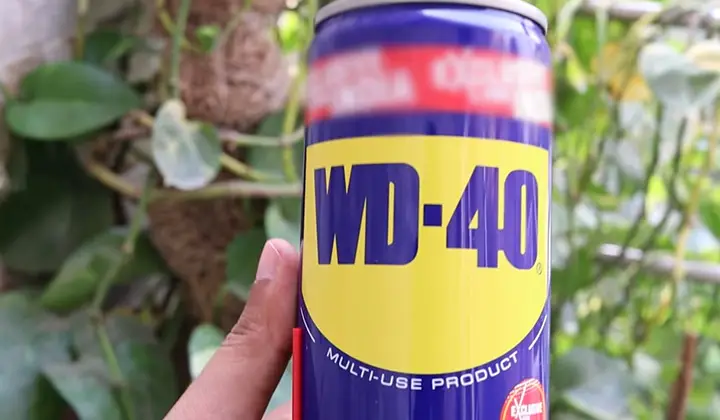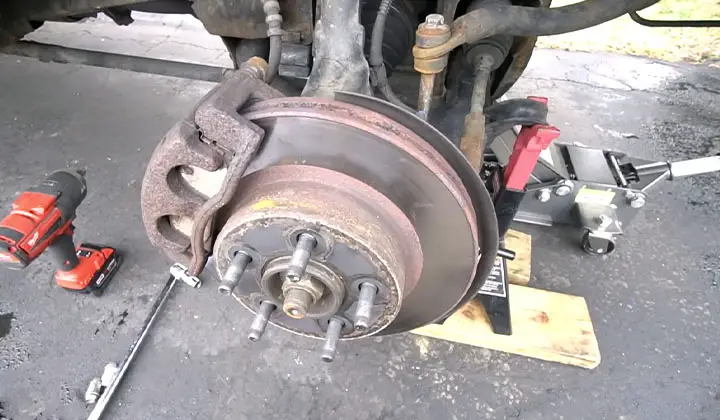It is not safe to spray WD40 on brakes. Although it may get rid of the squealing sound, it does cast a bad effect on the brake system. WD40 can reduce the friction of the brake pads. And can also hamper the control of stopping the car by leaving oil residues on the brake rotors.
Contents
What is WD40?
WD40 is the abbreviation of Water Displacement 40. It is mainly a solvent or more specifically a rust dissolving solvent. WD40 is predominantly composed of mineral oils and alkanes. Mineral oils include mostly baby oil and Vaseline. Also, many types of alkanes like decane, nonane, cyclohexane, etc. are used in it.

What is WD40 Used for?
People most commonly use WD40 to get rid of rust from metals. They even use this product to remove grease, grime, and more from surfaces. However, it is a multipurpose product and can be used for different issues as well.
- If you have stains on your tile from spilled nail polish or paint, then spraying WD40 will help you get rid of it. It also helps to remove the grimes from the floor.
- Isn’t it always very frustrating to clean the residues of a sticker or tape? Using this solvent, you can easily remove it from windshields or tiles.
- We often get so many stains on our towels or carpet from ink, coffee, or even hair dye. Spraying WD40 is the solution to these problems as well.
Is It Safe to Spray WD40 on Brakes?
It is absolutely not safe to spray WD40 on brakes. WD40 is very well known for reducing squealing or squeaking sounds. Consequently, many people use it on brakes to get rid of these sounds. It may help get rid of the annoying sounds but in the meantime, it may cause some serious damage to the brakes as well.
WD40 can decrease the friction of your brakes which is the most crucial characteristic of any brake. A decrease in friction leads to an increase in the time of stopping the vehicle. You should not spray WD40 in any part of the brake whether it is brake caliper or brake pads.
Retards the Braking Time of the Vehicle
WD40 is a good product for cleaning rust from surfaces. Which has led many people to use this to clean the rust from the brakes of their vehicle. WD40 cannot be classified as a lubricant. But it does possess some properties of a lubricant. Applying this on the rotor grease will highly disrupt its functions.
When you apply spray WD40 on brake rotors, the oil remains there as a residue for a long time. This leads to disturbance in time management of stopping the vehicle. The oil disables the vehicle to stop promptly. This issue can lead to severe accidents.
Damages the Brake Pad
Brake pads are located in between the brake shoe and brake drum and provide the necessary friction to stop the vehicle. Friction is what helps you stop the car when you step on the brakes. However, spraying WD40 on brake pads lessens the friction employed by the brake pad.
Additionally, using this product leads the brake pads to wear away or disintegrate. In a nutshell, spraying WD40 on brake pads can cause disorder which may lead to dysfunction of the brake pads. And if you do not pay attention to it, your brakes may fail in the middle of the road causing accidents and injuries.
WD40 Leads to Caliper Corrosion
The dust boot and piston seal may bloat when the brake caliper comes in contact with WD40. Water enters the piston bore as the bloated dust boot crumbles during the use of the vehicle. The entered water can easily cause great damage to the piston and the cylinder. Your vehicle may lose power and fail to accelerate correctly.
Moreover, WD40 can damage the functionality of the piston by causing the piston to stick. This may occur due to the corrosion of the piston seal. This may also lead the brake pads to wear down. The seal will overheat when the brake pads wear down and will start to leak and eventually cease to function.
How to Remove WD40 from the Brakes
If you sprayed WD40 on your brakes, you do not need to change the whole system to get rid of it. There are easier options. Mix a little dish detergent with a bowl of warm water. With the help of a clean cloth or brush, lightly scrub or brush the brake pad or disc to get rid of the WD40.
However, there still might be oil residues left there. To remove the oil residue, you can wipe the pad or disc with a little bit of alcohol. A safer option would be to clean them with a brake cleaner. Because the components of brake cleaners are safe and suitable for use on brake systems.
How to Get Rid of Squeaking Brakes
If it has been a long time since you changed your brakes then this is most likely the chance of getting the squeaky noises. In that case, you change the worn-down brake as soon as possible. Because other than the sound, decayed brakes can cause accidents.
But if this is not the case then you can take other initiatives. Take out the brake system and disassemble the pad, piston, and caliper. Now clean them thoroughly to remove any dirt. Apply anti-squeal adhesive to the piston very carefully and re-assemble the system. This will reduce the squeaky sound.

FAQ
Can I spray WD40 on my brake calipers?
No, you cannot spray WD40 or any kind of grease on your brake calipers. However, applying brake grease on the sliding pins of the caliper and the back of the pads is safe as long as it does not touch the friction surface.
What is a good substitute for brake cleaner?
Denatured alcohol can be considered as an alternative for brake cleaner. It gets the job done as well as a cleaning agent.
Is it normal for new brakes to squeak?
As new brakes are covered with protective components, they may make squeaky sounds at first. But it will go away after some time.
Conclusion
Avoid using WD40 on your brakes at any cost. If you want to eliminate the irritating sound of the brakes then there are other useful ways to do it. If you want to clean and remove dust from your brake system, you can simply use a brake cleaner formulated for this purpose only.
Some of the best brake cleaners are CRC Brakleen Brake Cleaner, 3M High Power Brake Cleaner, Permatex Non-Chlorinated Brake Cleaner, Gunk Non-Chlorinated Brake Cleaner, etc. Therefore, use a proper brake cleaner and restrain yourself from using WD40 as a brake cleaner.
